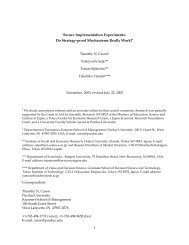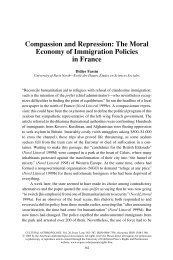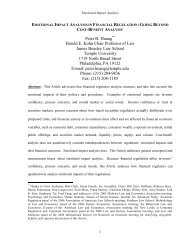Governance, Growth, and Development Decision-making - School of ...
Governance, Growth, and Development Decision-making - School of ...
Governance, Growth, and Development Decision-making - School of ...
You also want an ePaper? Increase the reach of your titles
YUMPU automatically turns print PDFs into web optimized ePapers that Google loves.
tutional prerequisites <strong>and</strong> one where they have been remarkably effective.<br />
A similar kind <strong>of</strong> institutionally-rich thinking has developed<br />
in a few other areas as well—as in education policy <strong>and</strong> in telecom<br />
regulation. But in many other areas, such thinking is either quite<br />
naïve or non-existent. I would cite trade policy <strong>and</strong> industrial policy<br />
as examples <strong>of</strong> the first <strong>and</strong> second categories, respectively. In trade<br />
policy, the long-st<strong>and</strong>ing advocacy by external advisors <strong>of</strong> uniform<br />
tariff rules (or <strong>of</strong> external commitments) is typically motivated by<br />
very poorly articulated political <strong>and</strong> institutional priors—basically<br />
lots <strong>of</strong> arm-waving. And in industrial policy, the dominant view—<br />
held essentially on a priori grounds—seems to be that the requisite<br />
institutional arrangement are impossible to design <strong>and</strong> implement,<br />
even when such a policy is desirable in principle.<br />
As the example <strong>of</strong> central banking shows, economists have a lot<br />
to contribute to thinking about such issues in specific policy areas.<br />
Their underst<strong>and</strong>ing <strong>of</strong> the substantive issues, their pr<strong>of</strong>essional<br />
obsession with incentives, <strong>and</strong> their eye for the unanticipated consequences<br />
give them a natural advantage in designing institutional<br />
arrangements to further the objectives in question while minimizing<br />
behavioral distortions. A certain amount <strong>of</strong> local knowledge<br />
is clearly indispensable here. Economists need to underst<strong>and</strong> the<br />
local context well enough to recognize the limits on the range <strong>of</strong><br />
possibilities <strong>and</strong> to anticipate the likely obstacles. But doing this in<br />
the context <strong>of</strong> relaxing a constraint in a particular policy area—be<br />
it monetary policy, trade policy, industrial policy, or education<br />
policy—seems to be me to be an order <strong>of</strong> magnitude simpler than<br />
designing wholesale legal reform or mounting an effective anti-corruption<br />
drive across the board. And as I have argued above, it is also<br />
more effective where growth is concerned.<br />
4. Avoiding the Best-practices Trap<br />
Designing appropriate institutional arrangements requires local<br />
knowledge <strong>and</strong> creativity. What works in one setting is unlikely to<br />
work in another. In a second-best, (i.e., real) world, the nature <strong>of</strong><br />
Dani Rodrik 21
















